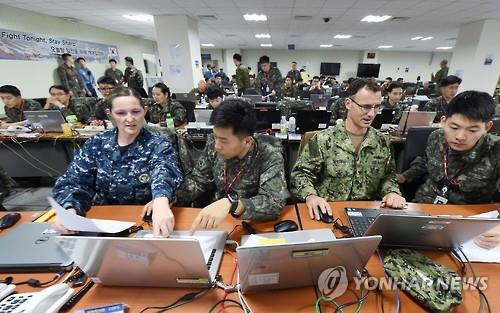South Korea and the United States wrapped up their weekslong combined military exercises on Tuesday, raising hopes for a halt in a series of missile launches by North Korea and a possible resumption of nuclear talks between Washington and Pyongyang.
The North has strongly bristled at the Combined Command Post Training and Crisis Management Staff Training, ratcheting up tensions with six rounds of missile or projectile launches and bellicose rhetoric over about three weeks.

"We've wrapped up the training as scheduled, and all the training sessions proceeded without a hitch," a military officer said.
This year's exercise, which replaced their summertime Ulchi Freedom Guardian exercise, involved computer simulations without the actual mobilization of troops or military equipment, which is part of the allies' reorganization of major exercises aimed at supporting peace efforts with North Korea.
But the training was based upon similar scenarios to previous ones and was composed of two parts just as the allies have done before: defending the country against invasion by North Korea and launching a counterattack in response.
"The focus of the exercise was to verify whether Seoul is on course to meet the conditions required for its retaking of operational control over its forces from Washington during wartime," a defense ministry official said, adding that the results of the initial operational capability (IOC) test will be discussed later this year.
For that test, the exercise was carried out under the envisioned platform of the future joint command, where a South Korean general commands the Combined Forces Command (CFC), with an American general taking the role of vice commander, according to the sources.
"All officials of South Korea's defense ministry also participated in the exercise to check and experience their future role after the OPCON transfer to Seoul," the official added. Previously, the exercise mainly involved South Korean service personnel from the CFC and the Joint Chiefs of Staff.
The two sides have agreed on a "conditions-based" OPCON transition. The conditions are the South's capability to lead the allies' combined defense mechanism, its capacity for initial responses to the North's nuclear and missile threats and a stable security environment on the peninsula and in the region.
No more major combine exercises are scheduled for this year between Seoul and Washington, except for small-scale ones between or among units, according to the military officer.(Yonhap)

